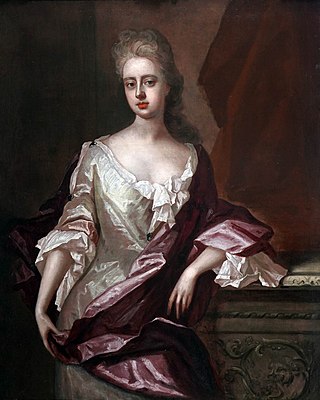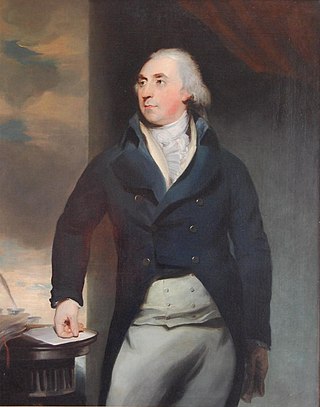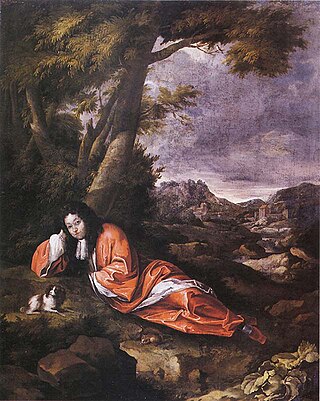Related Research Articles

Earl of Craven, in the County of York, is a title that has been created twice, once in the Peerage of England and once in the Peerage of the United Kingdom.

Viscount Massereene is a title in the Peerage of Ireland. It was created in 1660, along with the subsidiary title of Baron Loughneagh. From 1665 to 1816 the Skeffington Baronetcy of Fisherwick was attached to the viscountcy and from 1756 to 1816 the Viscounts also held the title of Earl of Massereene. Since 1843 the peerages are united with titles of Viscount Ferrard, of Oriel and Baron Oriel, both in the Peerage of Ireland, and Baron Oriel, in the Peerage of the United Kingdom. The Viscount also holds the subsidiary titles of Baron Loughneagh (1660) and Baron Oriel (1790) in the Peerage of Ireland and Baron Oriel (1821) in the Peerage of the United Kingdom. As Baron Oriel, he sat in the House of Lords until 1999.

Baron Brownlow, of Belton in the County of Lincoln, is a title in the Peerage of Great Britain. It was created in 1776 for Sir Brownlow Cust, 4th Baronet. The Cust family descends from Richard Cust (1622-1700) of The Black Friars, Stamford, who represented Lincolnshire and Stamford in Parliament. In 1677 he was created a baronet, "of Stamford in the County of Lincoln". He was succeeded by his grandson Richard Cust, 2nd Baronet, who married Anne Brownlow, daughter of Sir William Brownlow, 4th Baronet, "of Humby", Lincolnshire, and sister and sole heiress of John Brownlow, 1st Viscount Tyrconnel, 5th Baronet of Belton House, Lincolnshire. The 2nd Baronet's son Sir John Cust, 3rd Baronet, sat as a Member of Parliament for Grantham and served as Speaker of the House of Commons from 1761 to 1770 and in 1754 inherited the Brownlow estates, including Belton, on the death of his childless maternal uncle Viscount Tyrconnel. His son Brownlow Cust, 4th Baronet represented Ilchester, Somerset, and Grantham in Parliament and in 1776 was raised to the peerage as Baron Brownlow, "of Belton in the County of Lincoln", chiefly in recognition of his father's services. He was succeeded by his son John Cust, 2nd Baron Brownlow who had sat as a Member of Parliament for Clitheroe, Lancashire, and also served as Lord Lieutenant of Lincolnshire for many years. In 1815 he was created Viscount Alford, "in the County of Lincoln" and Earl Brownlow both in the Peerage of the United Kingdom. In 1810 the future 1st Earl had married Sophia Hume, a daughter of Sir Abraham Hume, 2nd Baronet, of Wormleybury, by his wife Lady Amelia Egerton, a great-granddaughter of John Egerton, 3rd Earl of Bridgewater.
Baron Louth is a title in the Peerage of Ireland. It has been created twice.

Baron Muskerry is a title in the Peerage of Ireland. It was created in 1781 for Sir Robert Deane, 6th Baronet. He had previously represented County Cork in the Irish House of Commons.

Baron Bellew, of Barmeath in the County of Louth, is a title in the Peerage of Ireland. It was created on 17 July 1848 for Sir Patrick Bellew, 7th Baronet, who had previously represented Louth in the House of Commons as a Whig and also served as Lord Lieutenant of County Louth. His grandson, the third Baron, was also Lord Lieutenant of County Louth and sat in the House of Lords as an Irish Representative Peer from 1904 to 1911. He was succeeded by his younger brother, the fourth Baron. He was an Irish Representative Peer from 1914 to 1931. In 1881 Lord Bellew assumed by Royal licence the additional surname of Bryan under the terms of the will of his maternal uncle Colonel George Bryan. However, he is the only one of the Barons to have held this surname. On his death the titles passed to his nephew, the fifth Baron, and then to his younger brother, the sixth Baron. As of 2018 the titles are held by the latter's grandson, the eighth Baron, who succeeded in 2010.

Marquess of Ripon, in the County of York was a title in the Peerage of the United Kingdom. It was created in 1871 for the Liberal politician George Robinson, 2nd Earl of Ripon.

Baron Carteret is a title that has been created twice in British history, once in the Peerage of England and once in the Peerage of Great Britain. The first creation came into the Peerage of England in 1681 when the fourteen-year-old Sir George Carteret, 2nd Baronet, was made Baron Carteret, of Hawnes in the County of Bedford. The peerage was originally proposed for his grandfather Sir George Carteret, 1st Baronet, a celebrated royalist statesman, but he died before he was granted the title and as his eldest son, Philip, predeceased him, it was eventually bestowed on his grandson, George, with remainder to the latter's brothers. The Baronetcy, of Metesches in the Island of Jersey, had been created for George Carteret in the Baronetage of England on 9 May 1645. Lord Carteret married Lady Grace Granville, daughter of John Granville, 1st Earl of Bath. In 1715 Lady Grace was raised to the Peerage of Great Britain in her own right as Viscountess Carteret and Countess Granville. Lord Carteret and Lady Granville were both succeeded by their son John Carteret, the second Baron and second Earl. The titles became extinct on the death of the latter's son Robert Carteret, the third Earl, in 1776.

Lady Frances Brudenell, Countess of Newburgh, was an Irish aristocrat known as the subject of a satire in which she was portrayed as the leader of a society of lesbians.
George Henry Lee I, 2nd Earl of Lichfield (1690–1743) was a younger son of Edward Henry Lee, 1st Earl of Lichfield and his wife Charlotte Fitzroy, an illegitimate daughter of Charles II by his mistress, the celebrated courtesan Barbara Villiers. On 14 July 1716 George Henry Lee succeeded his father as the 2nd Earl of Lichfield.

Baron Ponsonby, of Imokilly in County Cork, also referred to as Baron Ponsonby of Imokilly, in the County of Cork, was a title in the Peerage of the United Kingdom. It was created in 1806 for the William Ponsonby, who had previously represented Cork City, Bandonbridge and Kilkenny in the Irish House of Commons and Kilkenny in the British House of Commons. A member of the influential Ponsonby family, he was the eldest son of the Honourable John Ponsonby, second son of Brabazon Ponsonby, 1st Earl of Bessborough. His son, the second Baron, was a prominent diplomat and notably served as Ambassador to the Ottoman Empire and Austria. In 1839 he was created Viscount Ponsonby, of Imokilly in the County of Cork, in the Peerage of the United Kingdom. He was childless and the viscountcy became extinct on his death in 1855. He was succeeded in the barony by his nephew, the third Baron. He was the posthumous son of the Honourable Sir William Ponsonby, second son of the first Baron. Lord Ponsonby died childless and was succeeded by his first cousin, the fourth Baron. He was the son of the Right Reverend the Honourable Richard Ponsonby, third son of the first Baron. He died unmarried in 1866 when the barony became extinct.
Patrick Bellew, 1st Baron Bellew, known as Sir Patrick Bellew, 7th Baronet, from 1827 to 1848, was an Irish Whig politician.
Robert Tilson Deane, 1st Baron Muskerry PC (Ire), known as Sir Robert Deane, 6th Baronet from 1770 to 1781, was an Irish politician.
The Bellew, later Grattan-Bellew Baronetcy, of Mount Bellew in County Galway, is a title in the Baronetage of the United Kingdom. It was created on 15 August 1838 for Michael Bellew. He was a descendant of Christopher Bellew, brother of Sir Patrick Bellew, 1st Baronet. Thomas Bellew, younger son of the first Baronet, sat as member of parliament for County Galway. He married Pauline, daughter of Henry Grattan. Their son, the third Baronet, assumed by Royal licence the additional surname of Grattan. As of 2022 the title is held by the latter's great-grandson, the sixth Baronet, who succeeded his father in that year. The fifth baronet was a journalist, radio and television broadcaster and publisher.
The Honourable Gustavus Hamilton was an Irish MP.
Richard Hamilton, 4th Viscount Boyne was an Irish peer and politician. After serving in the Royal Navy and Irish House of Commons, he inherited the viscountcy from his Frederick Hamilton, 3rd Viscount Boyne in 1772 and died in 1789.
Bellew is a surname of Irish origin. The name may refer to:
Thomas Nugent, 4th Earl of Westmeath was an Irish soldier and peer. He was the second son of Christopher Nugent, Lord Delvin and Mary Butler, daughter of Colonel Richard Butler. He was likely the resident of Coolamber Hall House.
Frances Hales, later Countess of Lichfield, was an English aristocrat and philanthropist.

John Bellew, 1st Baron Bellew of Duleek was an Irish Jacobite soldier and politician.